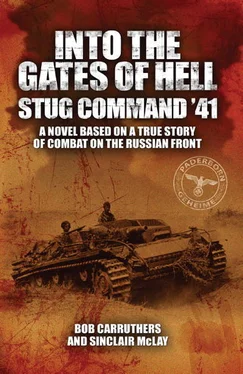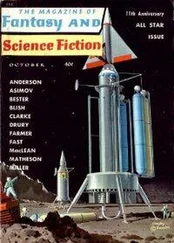Wohl’s heart sank to his boots. Sanger was a former university lecturer who was responsible for educating the battalion in the mysteries of radio communication, but he was unable to distinguish between post-graduate students and the landsers who manned the StuGs. He was either unable or unwilling to simplify his already difficult subject in order to make it accessible to his charges. Bemused incomprehension was the most frequent reaction to a session with the enthusiastic but impenetrable Sanger.
In von Schroif’s eyes rest after combat was essential. There was little as vulnerable as an exhausted crew, but training had also to be maintained. Much of it was repetition and reiteration but today the task was much more demanding and novel; getting SS-Kannonier Otto Wohl up to speed on the radio. The man charged with that task was a cliché of the academic prototype. He was tall and thin with round Himmler style glasses. His uniform seemed to have been purposefully tailored to ensure the worst possible fit. His thin neck did not give the impression that it actually touched his shirt collar. His narrow shoulders drooped inwards and, had regulations permitted, he would have worn a wispy beard and bow tie to complete the archetypal look.
SS-Obersturmführer Sanger was a man in a hurry. He felt that all he had to do was to relay the vast store of knowledge in his own head and somehow the student would be magically transformed into an expert. No sooner had Wohl sat down than he was into his stride.
“There are two forms of radio communication: clear speech and radio telegraphy or Morse. We have two components here, see? Now, this is the cable that connects them.”
“Yes, Obersturmführer.”
“This is the receiver. This is the transmitter. In order to send and receive, they must be connected. That is why the cable is so important.”
“Yes, Obersturmführer.”
“Now, each vehicle may have a different set of components, in which case each set is given a different designation, usually the letters ‘Fu’ followed by a number. Now what does Fu stand for?”
“ Funk ,” answered Otto Wohl.
“Correct,” replied SS-Obersturmführer Sanger, barely managing to conceal his exasperation. “Now, you may also come across the designation FuG, which is short for?”
“Funksprech Gerate , sir.”
“Well done, SS-Kannonier. Please try to maintain that level of concentration for the rest of this lesson. Now, I think we can dispense with the FuG designation as it mostly applies to aircraft radio sets. However, I think it is important that we cover only those radio sets found in our armoured vehicles. Why would that be, SS-Kannonier?”
“It may happen that we have to go to the aid of stricken comrades or in the event of breakdown or◦— God forbid◦— being hit. We may find ourselves having to commandeer another vehicle.”
“Excellent. Now, luckily enough for us, the set we have is the Fu.8. This is the set used by most of the Panzers too. So, here we have the 10 watt transmitter◦— designated 10 W.S.c. Here we have the ultra-shortwave receiver◦— designated UKw.Ee. Here are the two power transformers. Then, of course, there are the accessories◦— headphones, microphones and a key pad for Morse, which I shall return to in a minute. You have been refreshing your knowledge with the Morse code book as proscribed by the regulations?”
Otto Wohl nodded, but in a manner which even Sanger could only ever interpret as ‘unconvincing’.
“Now,” Sanger continued, “as I said, for all intents and purposes the Fu.8 is the only set we really need concern ourselves with at the moment. However, for the sake of completeness, it is only fair to mention the one major exception to this general rule.”
Sanger could see Wohl’s eyes squinting in pain, but he felt he did have to cover all the ground. In war, one never knew.
“The one major exception to these designations is the voice transmitter used in many combat support vehicles◦— generally armoured cars. Now you only have to remember this once. The Fu.Spr.f.”
“The Fu.Spr.f, SS-Obersturmführer.”
“Well done, SS-Kannonier. Now, our Fu.8 set is capable of transmitting both ‘ Telegraphie ’, also known as CW or Morse code, and ‘ Telefonie ’◦— voice amplitude-modulated signals. If we were stationary and were equipped with a frame roof aerial, the 30 W.S.a. transmitter would have a voice range of over 15 kilometres. This could be doubled with the use of a big 9-meter winch mast with a star aerial on top.
“Now,” Obersturmführer Sanger continued, pointing at the front of the unit, “the side-tone speaker cable is connected to the upper left corner post mount, while the two receptacles on the left of the face are for the receiver antenna binding post and ground. The two bottom-left receptacles are for the key and microphone leads and you can see that they are both connected. At the upper right of the radio face is the post for the antenna attachment, while the bottom-right connection is for power input from the dynamotor. Now, if we remove the cover from the transformer, what does it say on this decal here, SS-Kannonier?”
“Deckel nicht im Fahrzeug offnen ,” replied Wohl.
“And why would we want to keep the covers on?” asked Sanger.
“To keep air from getting in?”
Obersturmführer Sanger looked incredulously at Otto Wohl. “No…. To keep you from getting electrocuted! This thing supplies 12 volts at 2.7 amps for the filaments and 400 volts for the plate supply!” Sanger rolled his eyes in frustration. Getting angry would have been too easy though. He had to get this information across to Wohl and he knew that shouting at him would only make things worse. He decided to change the subject slightly. He could always return for reiteration later that evening.
“Please don’t tell me about it,” thought Otto Wohl to himself, his mind distracted by the sound of renewed heavy shelling in the fortress.
“Wohl, over here, now,” yelled Knispel.
There was the sound of revving engines. He saw the boss’s halftrack take its place at the head of the column. Clearly the decision had been taken that they would have another crack at the fortress.
Despite his extreme weariness and the impending sense of danger, Wohl felt relieved to be away from the tedious Sanger. To his surprise as he slipped into the vehicle he saw that the place of the late lieutenant in command of number 1 gun had been taken by von Schroif himself.
The StuGs followed the now familiar path from that morning’s first assault. As they rattled towards the fortress von Schroif filled in the tactical details.
“The situation has become somewhat confused. It looks as if the Reds have managed to take the Terespol gate back from our grenadiers and that has cut off our men who are in the citadel. There is also fighting going on at the other gates but the situation remains fluid. Our mission is to help the grenadiers seize the Terespol gate. We are expecting air support from a squadron of Sturzkampfflugzeug .”
Wohl was pleased to hear that the Stukas would be there to lend their weight to the attack. The psychological impact was immense; it heartened the German attackers and dampened the will of the defenders. Wohl was familiar with the powerful shriek of the sirens as the aircraft dived into the attack. “That’s good news. They terrify me, so God knows the effect they must have on the enemy!”
* * * * *
“Third-class ticket for Brest-Litovsk, without changing!”
As Oberleutnant Rossheim and his crews made their way to their aircraft and his squadron took off, the last remark from the ground personnel brought a smile to his face. As the front swiftly crumbled and collapsed on that June morning the entire Russian army had either retreated or been captured. From the air it was abundantly clear that the last frontier strong point left to the Russian forces was now the fortress of Brest-Litovsk, which had become an island left behind by the greatest outflanking battle hitherto fought in the history of war.
Читать дальше












